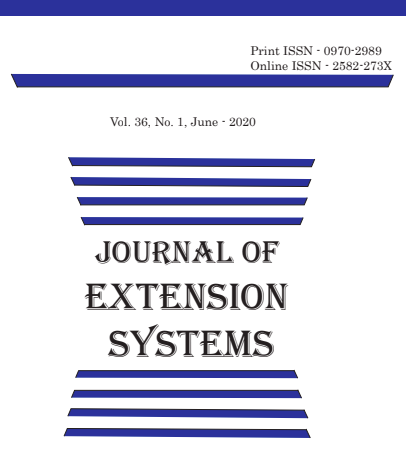Knowledge Test for Agricultural Graduates on Natural farming
DOI:
https://doi.org/10.48165/jes.2023.39.1.4Keywords:
Health, Farming, agronomy, agricultureAbstract
Natural farming is a sustainable agricultural approach that primarily focuses on enhancing soil health and minimizing input costs. To gain deeper insights into this emerging practice, it was imperative to develop a knowledge test aimed at assessing the level of understanding among agricultural graduates regarding natural farming. The study was conducted in the State Agricultural Universities (SAUs) of Uttar Pradesh, and the test items were carefully crafted, keeping in mind the academic proficiency of the target respondents. An initial knowledge test comprising 48 items was developed and subjected to a relevancy assessment involving 35 experts in the fields of agronomy and extension education. Based on their evaluations, 40 items were selected for pretesting. These items were then administered to 42 agricultural graduates from locations outside the study area to avoid sampling bias. Following this, an item analysis was conducted to calculate the difficulty index, discrimination index, and point biserial correlation for each item. Items were retained for the final test if they met the following criteria: a difficulty index between 0.20 and 0.80, a discrimination index above 0.10, and a point biserial correlation significant at the 5% level. The reliability of the knowledge test was evaluated using the split-half method, yielding a reliability coefficient of 0.75, indicating satisfactory internal consistency. Based on these analyses, a total of 30 items were finalized for the natural farming knowledge test designed for agricultural graduates. This knowledge test serves as a crucial tool to identify and bridge existing knowledge gaps among agricultural graduates. It can be effectively used to inform the design of seminars, workshops, and training programs, thereby equipping future agricultural professionals with accurate and practical knowledge on natural farming.
Downloads
References
Demirtas, H., & Hedeker, D. (2016). Computing the point-biserial correlation under any underlying continuous distribution. Communications in Statistics – Simulation and Computation, 45, 2744–2751.
Kumar, R., Slathia, P. S., Peshin, R., Gupta, S. K., & Nain, M. S. (2016). A test to measure the knowledge of farmers about rapeseed mustard cultivation. Indian Journal of Extension Education, 52(3–4), 157–159.
Kline, P. (1986). A handbook of test construction. Methuen.
Kaur, S., Kaur, P., & Pankaj. (2020). Farmers’ knowledge of soil health card and constraints in its use. Indian Journal of Extension Education, 56(1), 28–32.
Kerlinger, F. N. (2004). Foundations of behavioral research (2nd ed.). Surjeet Publications.
Kumar, Y., Rather, A., Peshin, R., Nain, M. S., Fatima, K., Singh, L., & Kanwar, M. S. (2020). Extent of knowledge of beekeepers in relation to improved apiculture practices in Jammu province. Indian Journal of Extension Education, 56(3), 69–75.
Singh, A. K. (2013). Tests, measurements and research methods in behavioural sciences (5th ed.). Bharati Bhawan.
Bhatt, P. M., & Patel, H. B. (2009). A scale to measure knowledge of dairy farmers regarding improved animal husbandry practices. Gujarat Journal of Extension Education, 20–21, 11–14.
Vijayan, B., Nain, M. S., Singh, R., & Kumbhare, N. V. (2022). Knowledge test for extension personnel on national food security mission. Indian Journal of Extension Education, 58(2), 191–194.
Gulati, A. (2000). The green revolution: Grain of truth. In India Today Millennium Series 2000 (pp. 102–103).
Chandini, Kumar, R., Kumar, R., & Prakash, O. (2019). The impact of chemical fertilizers on our environment and ecosystem. In Research Trends in Environmental Sciences (pp. 71–86). AkiNik Publications.
Palekar, S. (2005). The philosophy of spiritual farming (2nd ed.). Zero Budget Natural Farming Research, Development & Extension Movement.
Palekar, S. (2006). Zero budget natural farming: Five layers Palekar’s model (part i). Zero Budget Natural Farming Research, Development & Extension Movement.
EPW. (2019, July 27). Mirage of zero budget farming (Editorials). Economic and Political Weekly, 54(30).
Shotwell, A. (2016). Against purity: Living ethically in compromised times. University of Minnesota Press.
Economic Survey. (2019). Economic survey 2018–19. Department of Economic Affairs, Ministry of Finance, Government of India.
Lal, R. (2009). Soil degradation as a reason for inadequate human nutrition. Food Security, 1, 45–47.
Pingali, P. L. (2012). Green revolution: Impacts, limits, and the path ahead. Proceedings of the National Academy of Sciences of the United States of America, 109(31), 12302–12308. https://doi.org/10.1073/pnas.0912953109
Rahman, S. (2015). Green revolution in India: Environmental degradation and impact on livestock. Asian Journal of Water, Environment and Pollution, 12, 75–80. https://doi.org/10.1590/S0100-204X2014000700008
La Via Campesina. (2010). Sustainable peasant and family farm agriculture can feed the world. La Via Campesina.
Rosset, P. M., & Martinez-Torres, M. E. (2012). Rural social movements and agroecology: Context, theory and process. Ecology and Society, 17(3), 22-32.
Downloads
Published
Issue
Section
License
Copyright (c) 2025 Journal of Extension Systems

This work is licensed under a Creative Commons Attribution-NonCommercial-NoDerivatives 4.0 International License.

